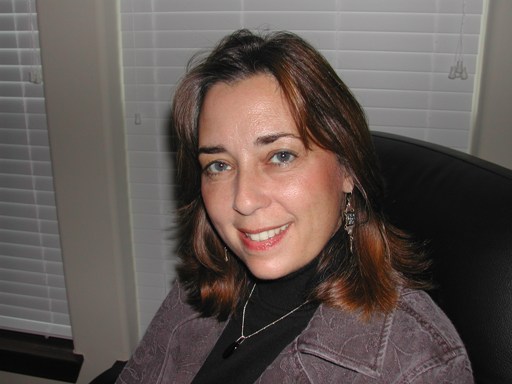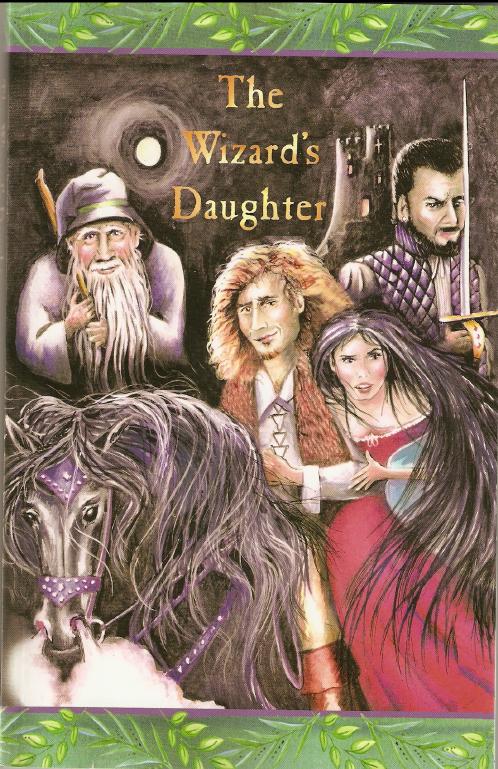An
Interview with
Victoria Graydale
conducted
by
Midge
Baker
|

Author
Bio
Victoria
Graydale has been making a living as a technical writer for over
15 years and has published countless pieces of non-fiction. She
has attended the Renaissance Fair in Texas and several other
events with her books. This is the first book in the fiction genre
from this author. She is thrilled to be published in her first
love, romantic fiction. After spending all that time writing about
computers and software, writing about Phaedra and Adrian was a
welcome change. She plans to write a trilogy with these
characters.
Born
in Germany while her father was in the military, she was raised in
the Michigan area. Victoria now lives in Houston, Texas, with her
husband of 25 years and delights in the occasional visits from her
two grown sons.
When
she's not in front of the computer screen, Victoria volunteers her
time to
Child Advocates, Inc., an organization that gives a voice
to children in CPS custody.
But her
favorite place to be when she's not with family? The golf course.
Says Victoria, 'You don't have to be good to have fun. Thank
goodness!'"
|

"
THE
WIZARD'S DAUGHTER has all of the elements: intrigue, mystery,
danger, and a quest with a wonderful hero and heroine, all wrapped
up in a love story. You'll enjoy going on their journey with
them."
~Debbie
Cavanaugh, mystery/romance writer
Author
of Where there's a Will
|
The
Interview:
MB:
Hello,Victoria. I really
appreciate this opportunity to interview you. For most of your
career, you've been a top-notch technical writer. What prompted you
to make the switch to fiction?
VG:
I've always written fiction.
When the opportunity came for me to be able to do technical writing,
I jumped on it. Obviously technical writing is much more stringent,
but there is still an art to communicating ideas.
MB:
How old were you when you
started writing? When you made your first sale?
VG:
I've been writing since
elementary school. In the third grade, my teacher "published"
my first work, "The Teacher Book" about a third grade field
trip. She ran off mimeograph copies and helped me cut the pages in
half and staple them together. My first sales were actually jokes,
which sold for $1 each. This was years ago - before the Internet. I
would send in jokes, and they would send me a dollar bill back for
each one they accepted.
MB:
Did you take any writing
classes when you were just starting out?
VG:
I took some creative writing
courses in college, and I have joined various writing groups over the
years, which I think is very helpful as long as you have thick skin.
For almost a year I was a member of Chris Rogers' "Master
Writing Class." This was the best of both worlds - a first class
teacher plus other writers critiquing my work.
MB:
Every author I've met so far
also an avid reader. What genres do you enjoy?
VG:
I literally read everything. I
purposely switch between classics, non-fiction, romance, mystery,
mainstream, and so on. I am in a bookclub, which exposes me to many
titles I might not have otherwise read, and I have a lot of friends
who read so we swap recommendations.
MB:
How much time of your day is
devoted to writing? Do you write every day?
VG:
Unfortunately, I have to be in
the mood to write. Being in front of a computer 8 hours a day to pay
the bills sometimes makes it hard to sit there again and be creative.
So when I'm "in the zone" I write as much as I can. When
I'm not, I do research for projects I'm working on or read.
MB:
Is there anyone you credit
with helping you get into writing?
VG:
In second grade, a librarian
handed me Little House in the Big Woods; Mrs. McNulty.
I've been reading and writing ever since.
MB:
Can you tell me about your
writing methods? For example: do you write from the beginning of the
story to the end, write scenes in random order, or have a development
cycle of some sort?
VG:
I like to have a general
outline, and then I write the scenes that I am "feeling"
that day. Definitely not in order. There are too many fun surprises
that happen as I write for me to follow a stringent, detailed
outline. A fellow writer, Scott D. Parker, has developed a method
where he uses sticky notes to storyboard his scenes. I'm anxious to
try this out. When I'm "stuck" I like to golf. It totally
clears my mind of everything except trying to get that stupid ball in
the hole. Then the next time I sit down to write, it seems like the
easiest thing in the world.
MB:
What tools do you use when
you research a story?
VG:
The library, the Internet, and
people. I'm working on a story right now that is a modern romance,
but part of the story involves flashbacks to two people who fell in
love in the 40's. My mother-in-law has been my best research tool for
this!
MB:
Tell me about your work with
Child Advocates, Inc. Do you find your experiences there seeping into
your stories?
VG:
Child Advocates is without a
doubt the most rewarding experience of my life. I have been
volunteering for six years now. It is absolutely heart breaking to
see the lives that some people and their children live. But there are
many happy endings where the child is adopted by a relative or foster
parent, and you know that their life has changed for the better. It
is sometimes shocking to see the difference in a child after they
have been removed from an abusive situation and put into one where
they are loved and cared for. Someday I would love to write a story
that centers around the type of work that Child Advocates does to
raise awareness, but my instinct is to protect, protect, protect so
it would be hard to open up those situations and emotions.
MB:
What do you consider your
strongest writing skill? Your weakest?
VG:
I consider my strongest writing
skill my dialog, simply because I find that the easiest to write.
Traditionally, my weakest is point of view.
MB:
What do you think is the
most important thing for writers who want to continue to improve?
VG:
Feedback. That's why I think
writer's groups are so valuable if you get a good group of people who
will give you honest criticism. Friends and family think they are
helping when they give you a good review to encourage you, and I
guess they are, but find people who aren't afraid to tell you if a
scene isn't working for them, or if they think your dialog is hokey,
or if they think your hero is an idiot. Then take all of it (good,
bad, and ugly) with a grain of salt.
MB:
Let's talk about about THE
WIZARD'S DAUGHTER, your latest release, from Stargazer Press. Where
did you get the idea for the story? Was it character-first or an
idea-first story? How long did it take you to develop the story? Was
it fully developed before you started writing, or did it 'come to
you' as you wrote it?
VG:
The title came to me first.
Traditionally, wizards are loners so the idea of a wizard with a
daughter appealed to me. I had a general outline, but the story
developed itself as I wrote. I entered the first three chapters and a
synopsis into a local writer's guild contest and won first place.
After that, I decided I'd better finish it.
MB:
Are you planning any more
stories with these characters? Are you working on any other stories?
VG:
Yes - I would like to write
more with these characters. I thought I wrapped up the story pretty
well, but everyone wants to know what happens with Adrian and Phaedra
next, and I just adore Rufus. I would like to see what happens with
him myself! I wrote a few short stories to give myself the sense of
completion (sold one to TRUE LOVE magazine, which appeared in their
October issue) and I've got some other things started. Time is always
the issue. Trying to work and promote
The Wizard's Daughter
takes up most of it.
MB:
Do you have any advice for
the aspiring writers in our audience?
VG:
Be true to yourself. Don't take
criticism personally. Write on.
MB:
If you had it to do all over
again, would you do anything differently?
VG:
No. I've made mistakes, but I've
learned from them and so I move on. There's no telling what I would
mess up if I went back and tried to do it all again!
MB:
Thanks again for this
opportunity.
VG:
Thank you! I'd like to leave
you with a quote from the pastor of my church, which I wrote down
many years ago: "It's never too late to be who you might have
been."

